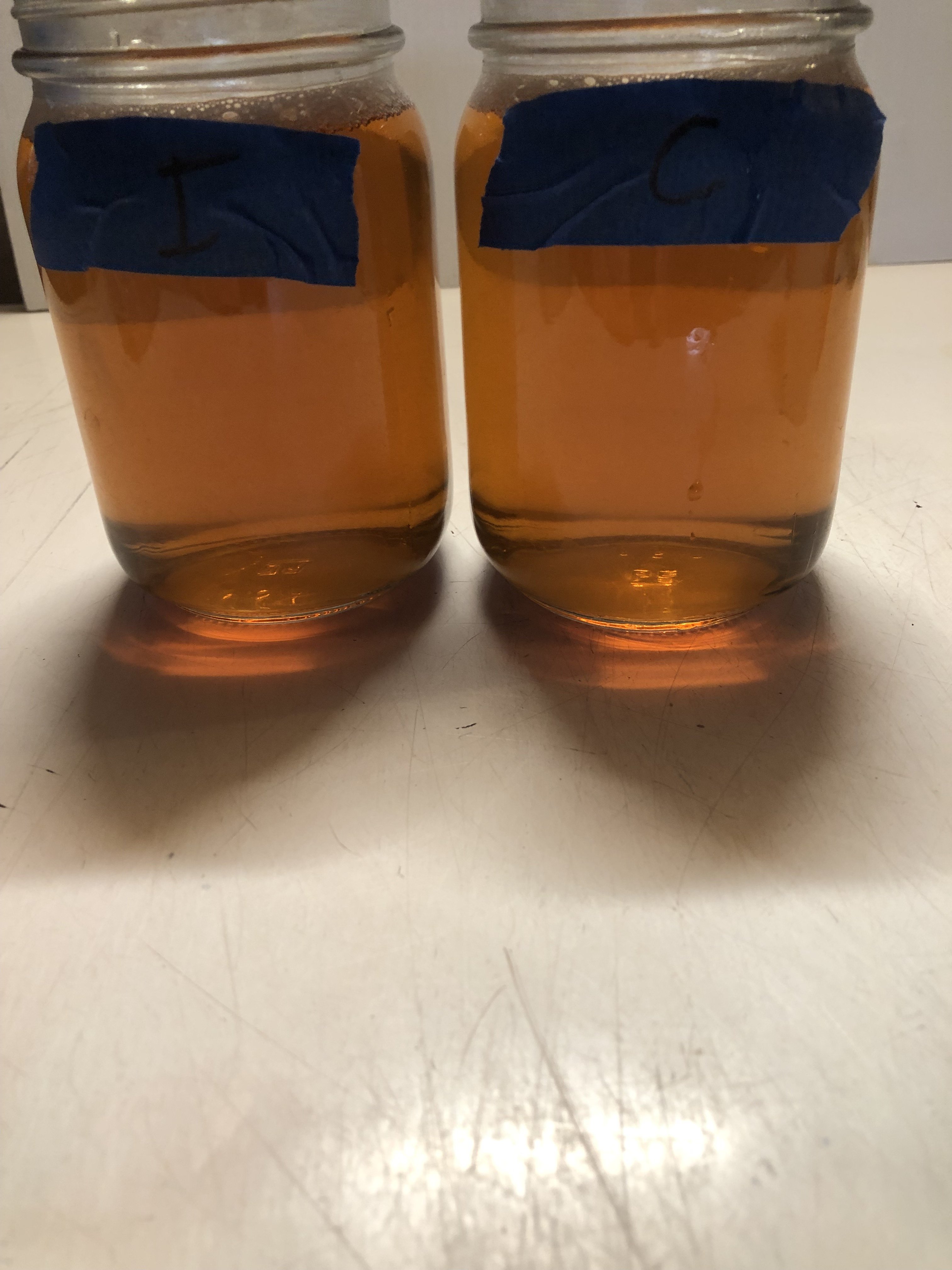- Joined
- Feb 19, 2017
- Messages
- 979
- Reaction score
- 1,238
I ended up going with 6# Chavallier, 1# invert, first gold/BX hops, Pub yeast and clarity ferm. Fermenting away nicely. Hydrometer sample is nice and seeing how the flavors develop

The secret for good head lies in the step mash (also for attenuation). Best is 62/72/77c for 30/30/15 minutes. Still good
It takes a few times to really dial it in, yours should be good!Well, today I gave it a go. My very first multi-step mash.
I do BIAB in a simple pot so I attempted to hit each new step with infusions of a calculated volume of boiling water. My realized temps were 62/70/74. Not too bad for a first attempt.
I did notice an increase in efficiency. 82-->89%, putting my OG at 1.044 instead of 1.040.
The real assessment will be when I pour that first glass. Hopefully a nice layer of foam will assure me a more complicated brew day is worth it.
Nice!
The yeast is acually THE key ingredient in this recipe. So if you change the yeast, you'll get a completely different beer. Of course, your beer might also end up being a nice one. As long as the yeast produces loads of aromas it should be fine, just different obviously.
Let me know how it turns out please!
It is in the fermenter. The pub woke up in the vitality starter after two hours and I didn't change the recipe much.Soooooo, next iteration of Miraculix' best is about to happen tonight.
I have a pack of pub in the fridge that got stuck in transit for over 1.5 months and all the rest is there as well. I might try using chevallier as the base malt while upping the mash temp to create less alcohol in the final beer while maintaining the taste.
Anyway, there's a chance that the yeast is dead. I will do a vitality starter over night, to see if I get activity. I do no chill anyway, so no additional time required for this.
If the yeast is not showing activity, I might get freaky and throw in lallemand abbaye instead. I have only kind of boring yeast alternatives flying around, so the choice is made based on the fact that this beer needs an expressive yeast. The obvious dry alternative would be verdant IPA, but I do not have any of it left.
So let's see what we will get here! Belgian Patersbeer or English bitter.









![Craft A Brew - Safale S-04 Dry Yeast - Fermentis - English Ale Dry Yeast - For English and American Ales and Hard Apple Ciders - Ingredients for Home Brewing - Beer Making Supplies - [1 Pack]](https://m.media-amazon.com/images/I/41fVGNh6JfL._SL500_.jpg)


You're a few hours ahead of me. I'll be opening the first bottle of my most recent best bitter bottled two weeks ago.
This one is the batch on which I attempted a multi-step mash for the first time. To isolate the major process change, I went back to my typical bitter grist. 85/5/10 MO/C65/invert.
Loving the Pub. I've got a 1845ish strong ale finishing up on a 3rd generation pitch. 7days into fermentation it's already delicious. Getting ready to brew an Optic/EKG/Pub AK next. Thanks for turning me on to this yeast.

The golden syrup is common in many British ale
Inverting cane sugar turns it into glucose which the same as corn sugar, from that point it is a reasonable substitute. As glucose enhances ester production that seems to be the most important part of including golden invert sugar in a recipe.
Sure there is some caramelization in the lyle's golden syrup but even at 10% of the grain bill the flavor added should be subtle when diluted into 4.0gal of water especially with the addition of crystal malt.
Inverting cane sugar turns it into glucose which the same as corn sugar, from that point it is a reasonable substitute. As glucose enhances ester production that seems to be the most important part of including golden invert sugar in a recipe.
Sure there is some caramelization in the lyle's golden syrup but even at 10% of the grain bill the flavor added should be subtle when diluted into 4.0gal of water especially with the addition of crystal malt.
To be fair, I never made a side by side comparison, and as there is already a lot of different flavour contribution from the crystal and the yeast, it is very hard to pinpoint the contribution from Lyle's. It would be itneresting to see how pure glucose would compare against the same amount of Lyle's.Thanks for the information regarding fructose in invert sugar @Miraculix and @z-bob.
My comments were mostly with respect to the lyle's golden syrup, to me the flavor from the tin does not translate to anything significant in the final product. Homemade invert made with raw sugars have more flavor and color even with minimal cook times.
Different people have different threshold to flavors so maybe others can taste the difference. I know I can pickup the the burnt roast flavors from the small additions of black malt from the Wheeler recipes for color corrections so maybe others can pickup something from Lyles syrup.


Uhhhh niiice, let us know about the outcome! I love experiments like this one!As I had a tin of Lyle's I decided to double my past experience. First I put 5gm in 8oz of water(10% with 60%BHE) to see what it would look and taste like at a scaled down volume. I was surprised at how much color it added but there was very little flavor once diluted.
A side by side of Lyle's golden syrup vs corn sugar, 6oz of either in approximately 2.5gal.
View attachment 731967View attachment 731968
Fawcett golden promise and white wheat, british crystal 50/60 full volume no sparge mash, it is being fermented with verdant yeast. The jars and fermentors are opposite.